If you are looking for the top keyword research tools of 2024, then you are in the right place.
Even in the era of constant development, SEO and digital marketing keyword research remain the most powerful tools. It tells you what people are looking for, directs the content you produce, and, in turn, brings traffic to your website. Keywords are very important for search engine optimization (SEO).
In general, keywords are crucial for any marketing and SEO campaign because keywords define the search terms users use, so the business should use relevant keywords to create content.
In this blog, we have added the top 12 keyword research tools of 2024, which will help you boost your SEO. We will further highlight their benefits and why they stand out from the r
What is keyword research?
Keyword research may simply be the process of identifying the most appropriate phrases or words to use on a particular website.
By definition, keyword research is the identification and categorization of the terms that people type on a search engine to get information about a product, a service, or anything. It entails identifying the terms PC users type while talking about the business.
Benefits of keyword research
It is always essential to have a clear understanding of some of the benefits that come with the right keyword research for any online marketing plan or campaign.
First, it enables the business to find out the kind of searches its target market is making so that it may produce content that meets the needs of the interests of the target clientele members.
Moreover, keywords are necessary to find out the niches that competitors do not give attention.
It helps the business to be well positioned to capture such opportunities thus attaining a competitive advantage over rivals.
Furthermore, among some of its functions, it has been widely used in paid search advertising since it allows for proper investment of the advertisement funds in the keywords.
Suggested Read: Email Marketing Tools
12 BEST KEYWORD RESEARCH TOOLS TO TRY IN 2024
Keyword research is always an important part of any SEO campaign to be effective optimization. There is specialized software that can assist you in finding useful keywords and making sense of the search patterns, thus making your content better. Below is the list of the 12 best keyword research sites with their advantages, disadvantages, costs, and links to their sites.
1. Google Keyword Planner
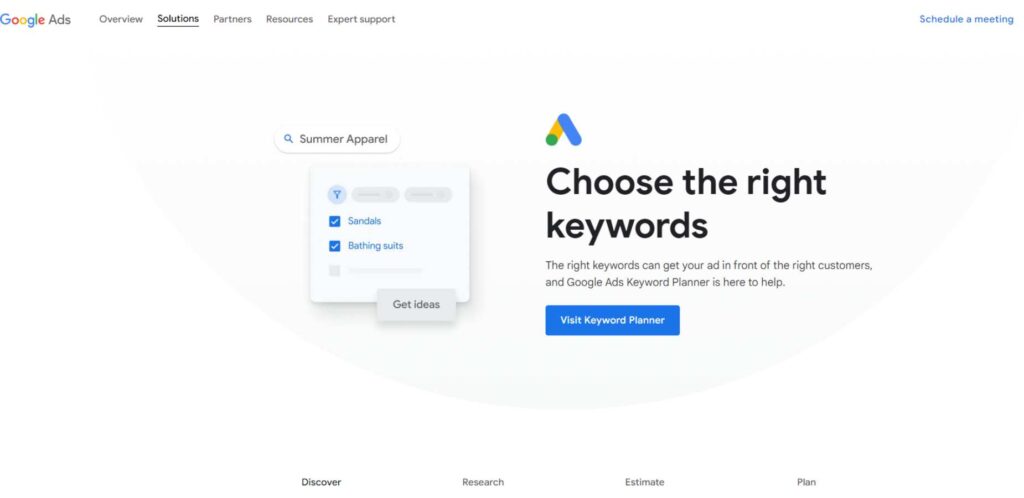
Google Keyword Planner is an important tool used for keyword research, and it additionally offers great insights into the keyword volume, competition, and also cost-per-click data. As it is already integrated with Google Ads, it provides a great view of keyword performance and your search engine. It is suitable for both free and paid search strategies, which will further help you make good decisions about your keyword targeting.
Main features:
- Reasonable metrics: Help you evaluate the competition level for keywords.
- Search volume data: You can see the frequency of search of a specific keyword.
- Suggested keywords: Get great ideas based on your given keywords.
Positives:
- Free if you have a Google Ads account
- Data extracted directly from Google
- Can be used easily with Google ads
Negatives:
- Not very many features for people who are not advertising
- It is compulsory to have a Google Ads account
- Fewer data that is detailed for low-volume keywords
Pricing: Free (requires Google Ads account)
Website: Google Keyword Planner
2. SEMrush
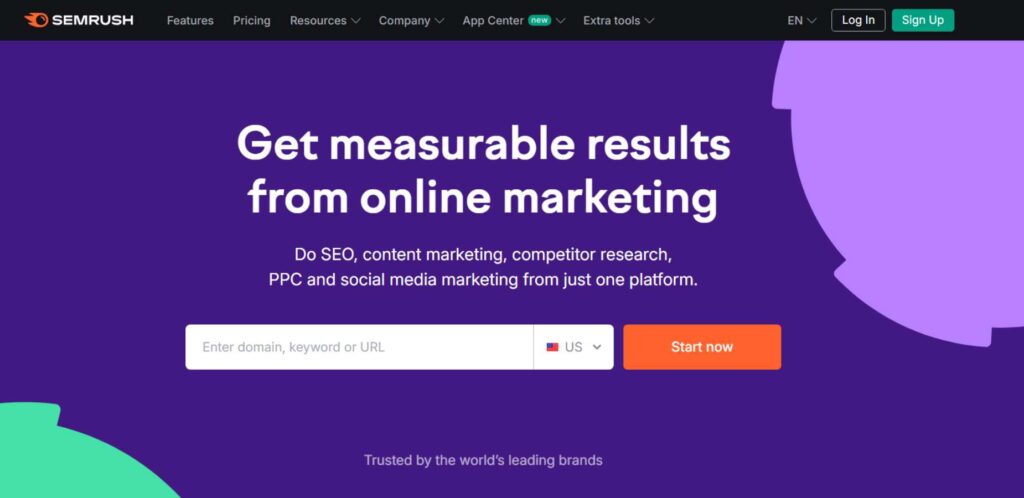
SEMrush is a great digital marketing tool that helps in keyword research and also in analysis with the competition. It also provides great insights into the keyword volume, competition, and trends. It also helps identify keyword gaps, which is great for digital marketing. The tool’s features also allow you to analyze the keywords of competitors and improve your SEO strategy for improved results.
Main Features:
- SERP Analysis: It gives detailed results of search engine page analysis.
- Competitive keyword analysis: It provides great insights into competitors’ keywords.
- Magic keyword tool: It provides an extended database consisting of keyword suggestions.
Positives:
- Extensive database
- Detailed analysis of competition
- Multi-functioning of SEO tool
Negatives:
- Not economically feasible for small business
- Steep learning curve
Pricing:
- Pro plan: $119.95 per month
- Guru plan: $229.95 per month
- Business plan: $449.95 per month
- Executive plan: Custom pricing tailored according to your needs.
Website: www.semrush.com
3. Ahrefs

Ahrefs’ Keywords Explorer provides deep metrics of keywords such as keyword difficulty, click-through rates, and search volume. Additionally, it features a vast keyword database and valuable data on SERP features and also keyword opportunities. This tool is highly appreciated for its accuracy and in-depthness. That is why this tool is also a favorite among SEO professionals.
Main Features:
- Keyword Explorer: Comprehensive tool for keyword research.
- Traffic estimation: It accurately estimates traffic the site will get from given keywords.
- SERP Overview: It gives detailed results of search engine page analysis.
Positives:
- Overall, keyword research tools
- Additional backlink data
- Accurate traffic estimation
Negatives:
- Very pricey
- Might be difficult to use for newbies
Pricing:
- Lite Plan: $99 per month
- Standard Plan: $199 per month
- Advanced Plan: $399 per month
- Enterprise Plan: Custom pricing tailored according to your needs.
Website: ahrefs.com
4. Moz Keyword Explorer
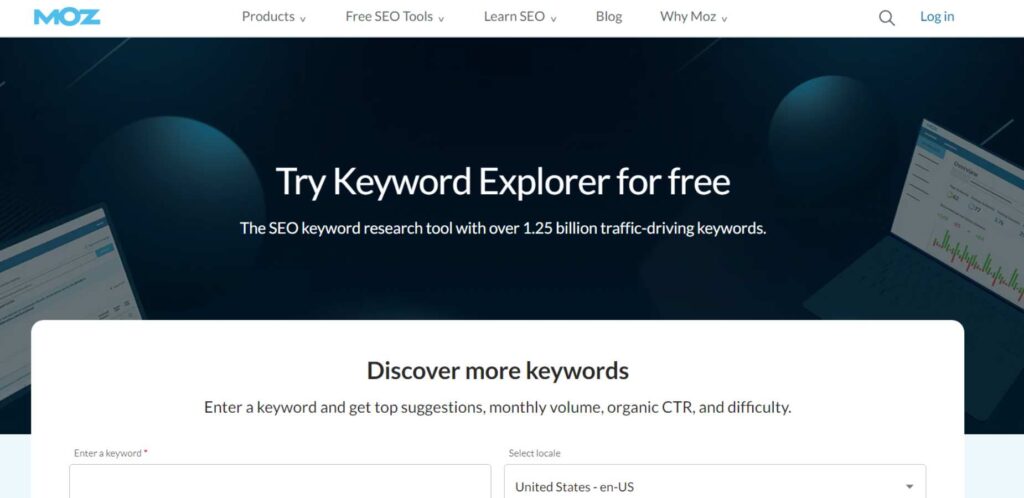
Moz Keyword Explorer is a great tool that offers search volume data, keyword suggestions, and competition analysis. It has a feature called the “Priority” score that helps prioritize keywords that will be more beneficial, based on their impact. The tools provide a great user-friendly interface and are a great tool to refine your keyword strategy.
Main Features:
- Get keyword suggestions: Get to know about useful keyword ideas.
- Priority score: Help prioritize keywords that provide great impact.
- Difficulty score: Remove keywords that are difficult to rank.
Positives:
- Up to the point of difficulty and priority score
- Easy to use for everyone
- Integrated with Moz’s other SEO tools
Negatives:
- Not many features in the basic plan
- A bit pricey for advanced features
Pricing:
- Standard Plan: $99 per month
- Medium Plan: $179 per month
- Large Plan: $299 per month
- Premium Plan: Custom pricing tailored according to your needs.
Website: www.moz.com/explorer
5. Ubersuggest
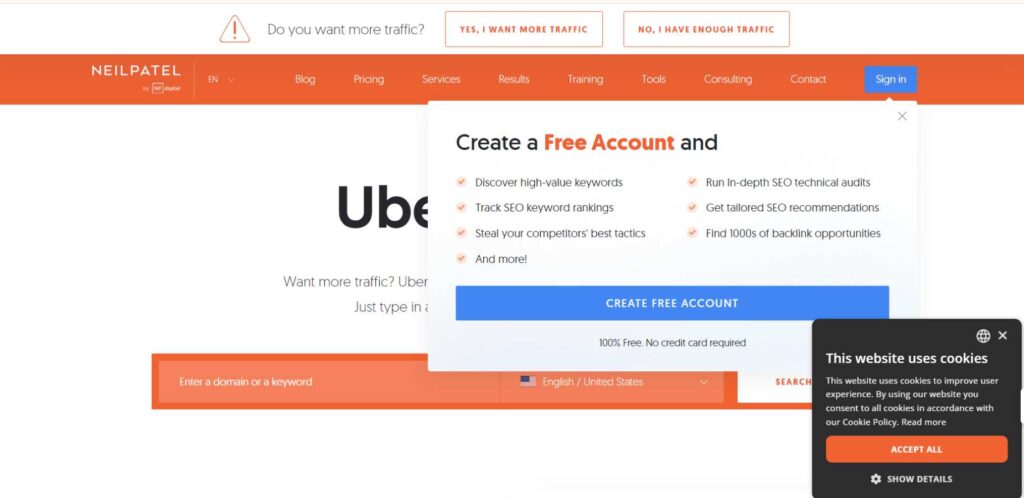
Ubersuggest is made by Neil, and it provides great features like search volume data, competitive insights, and keyword suggestions. In addition to all these, it is also affordable. It is known for its simplicity and is an excellent tool for beginners to start with.
Main Features:
- Ideas for content: Makes content ideas based on keywords given.
- SEO Analysis: Insights into SEO performance and optimization.
- Suggested keywords: It helps find those keywords that have search volume and competition data.
- SEO Analysis: Helps in SEO performance and using it optimistically.
Positives:
- Affordable price
- User-friendly interface
- Great for content ideation
Negatives:
- Not much data compared to premium features
- Lesser advanced features
Pricing:
- Free plan: Free
- Individual plan: $12 per month (billed annually)
- Business plan: $20 per month (billed annually)
- Enterprise plan: $40 per month (billed annually)
Website: www.app.neilpatel.com
6. KWFinder
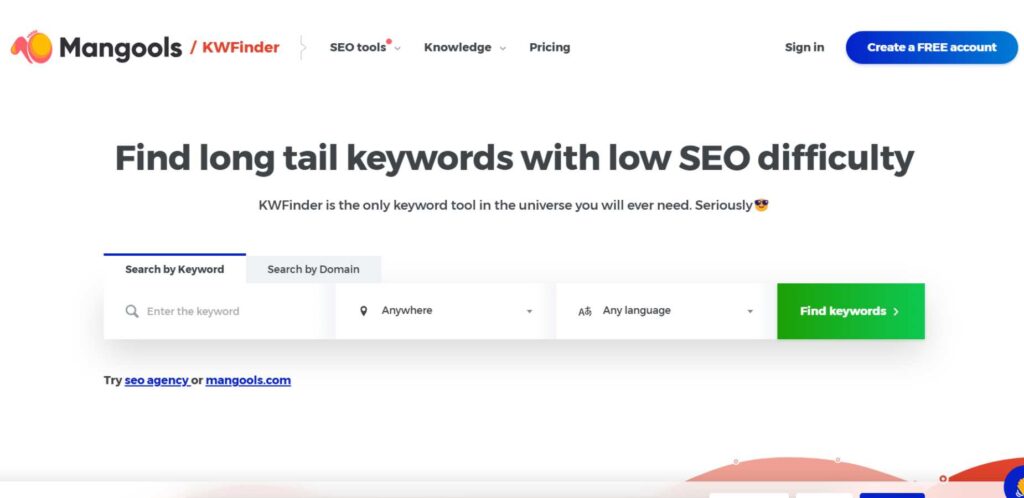
KEFinder developed by Mangools specialises in finding long-tail keywords that will be great for SEO. It also offers keyword difficulty scores that help identify lower competition. It additionally focuses on long-tail keywords and makes valuable and attainable keywords.
Main Features:
- Keyword Difficulty Analysis: Get access to difficult keywords
- SERP Analysis: View search engine results for keywords.
- Local Search Volume: See data specific to different regions.
Positives:
- Intuitive interface
- Good for long-tail keywords
- Economically affordable
Negatives:
- Lesser trend data
- Not many features as compared to other tools
Pricing:
- Basic plan: $29.90 per month (billed annually) or $39.90 per month (billed monthly)
- Premium plan: $39.90 per month (billed annually) or $49.90 per month (billed monthly)
- Agency plan: $79.90 per month (billed annually) or $99.90 per month (billed monthly)
Website: www.kwfinder.com
7. AnswerThePublic
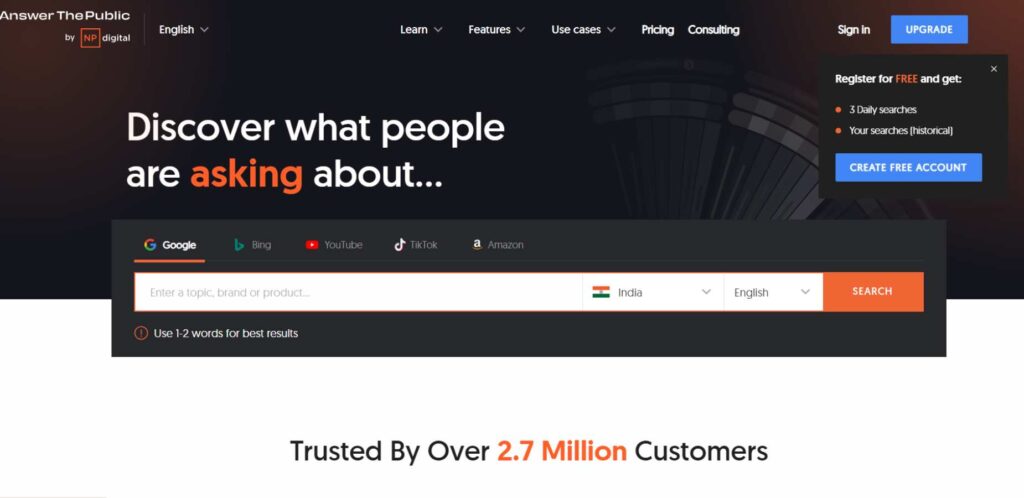
AnswerThePublic is a great tool that generates keyword ideas based on common questions and comparisons related to your seed keywords and prepositions. This tool helps visualize keyword data, which will further help understand user intent and discover content ideas based on search queries.
Main Features:
- Question-Based Keyword Ideas: Generate ideas based on common questions.
- Visualization of Keyword Data: View keywords in a visual format.
- Search Prepositions: Explore keywords with prepositions and comparisons.
Positives:
- Different keyword ideas
- Great for brainstorming content
- Free basic plan available
Negatives:
- Lesser keyword volume data
- Not feasible for competitive analysis
Pricing:
- Free plan: Free
- Pro plan: $99 per month (billed annually) or $129 per month (billed monthly)
- Enterprise plan: Custom pricing tailored according to your needs.
Website: www.answerthepublic.com
8. KeywordTool.io
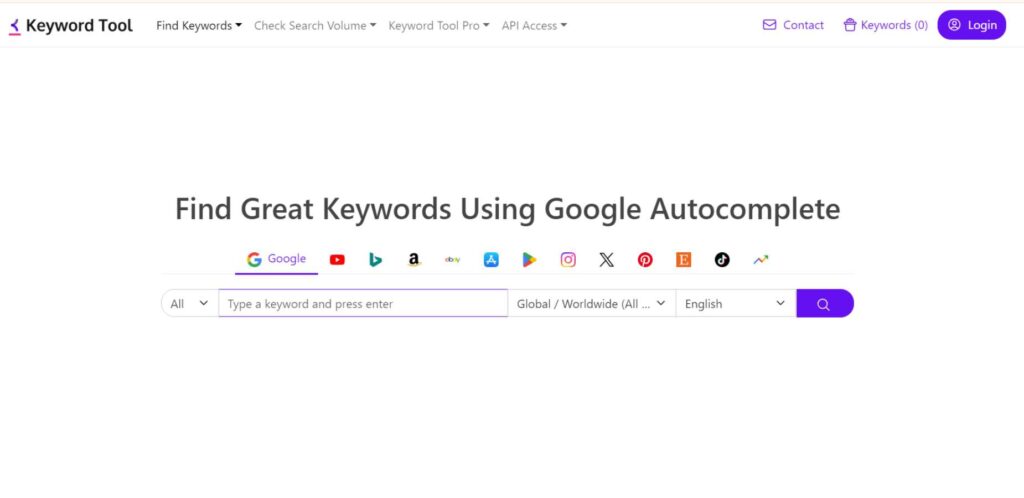
Keyword tool generations various keyword suggestions with the help of Google Autocomplete data and supports multiple platforms like Amazon, Bing, Google, and YouTube. It is also useful for finding keywords within different search engines and varied content types. Additionally, it provides a broader perspective on keyword opportunities.
Main Features:
- Long-tail keywords: Provides specific keywords that are not much in competition.
- Volume data: This will show the frequency of keywords used.
- Keyword suggestions: Will get ideas for keywords from different platforms.
Positives:
- Large coverage of keywords
- Can be used across various platforms
- Free basic plan available
Negatives:
- Lesser features in the free version
- Very pricey for a full-access version
Pricing:
- Free plan: Free
- Basic plan: $69 per month (billed annually) or $89 per month (billed monthly)
- Plus plan: $79 per month (billed annually) or $99 per month (billed monthly)
- Business plan: $159 per month (billed annually) or $199 per month (billed monthly)
- Enterprise plan: Custom pricing tailored according to your needs.
Website: www.keywordtool.io
9. Long Tail Pro
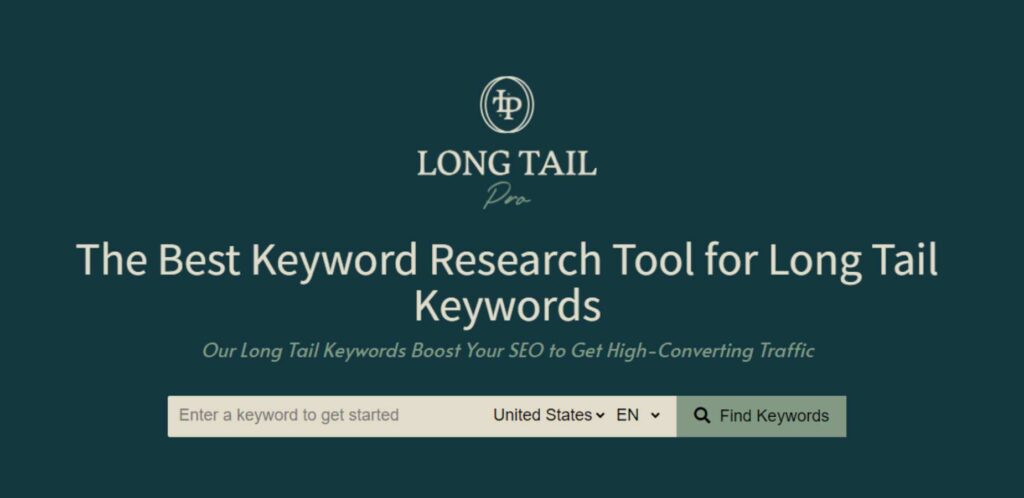
Long Tail Pro is a tool designed to assist users in looking for long-tail keywords that may attract less competition. The tool offers keyword competitiveness scores and great data on the actual search volume. This tool therefore suitable for specialized product categories and for finding opportunities in less competitive keyword areas.
Main Features:
- Long-tail keywords: Provides specific keywords that are not much in competition.
- Keyword analysis: Evaluates ranking difficulty according to competitiveness.
- SERP Analysis: It gives a detailed result of search engine page analysis.
Positives:
- Effective for low-competition keywords
- Detailed analysis of competition
- User-friendly interface
Negatives:
- Focuses more on broader keyword data
- Very pricey
Pricing:
- Starter plan: $37 per month (billed annually) or $44 per month (billed monthly)
- Pro plan: $67 per month (billed annually) or $79 per month (billed monthly)
- Agency plan: $97 per month (billed annually) or $119 per month (billed monthly)
- Enterprise plan: Custom pricing tailored according to your needs.
Website: longtailpro.com
10. SpyFu
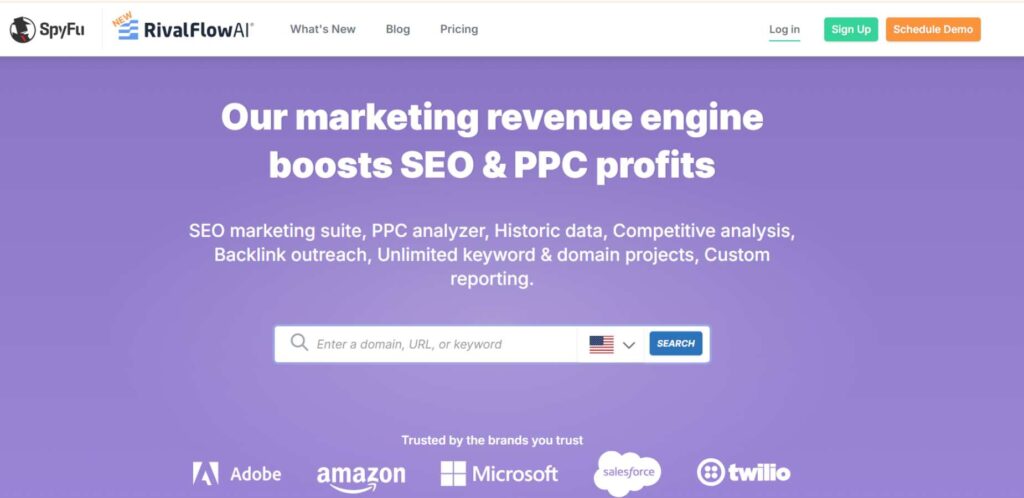
SpyFu is one of the best tools for competitive keyword spying. As it helps one identify keywords that competitors use in ranking and their Ad spend plans. SpyFu offers statistics for the past month and year on the keyword positions and strategies that competitors are using and gives practical tips on SEO and PPC trends, which makes it very helpful in creating a sound strategy.
Main Features:
- Competitor Keyword Analysis: More specifically, it is possible to find out the keywords competitors are pursuing:
- PPC and SEO Insights: Consider the geographic location of keywords, being organic and paid keywords.
- Historical Data: This will enable me to access historical keyword performance data.
Positives:
- Great for competitive research
- Historical keyword data
- Very affordable
Negatives:
- The interface can be cluttered
- Limited features for non-SEO aspects
Pricing:
- Basic plan: $39 per month (billed annually) or $49 per month (billed monthly)
- Professional plan: $79 per month (billed annually) or $99 per month (billed monthly)
- Team plan: $299 per month (billed annually) or $399 per month (billed monthly)
- Enterprise plan: Custom pricing tailored according to your needs.
11. Serpstat
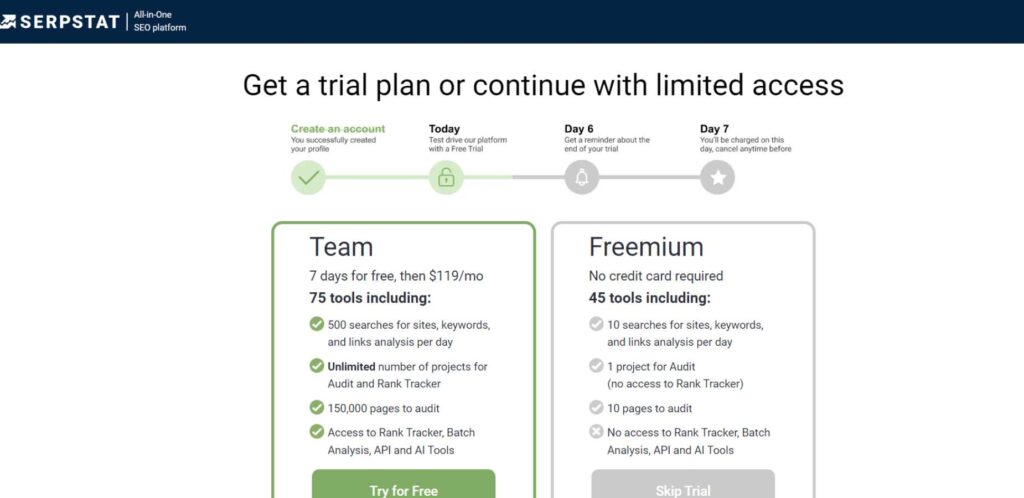
Serpstat is all-in-one software for an SEO audit, and it also provides a powerful set of tools for keyword research: keyword volume, keyword difficulty, and trends. It also offers competitor analysis so that one can find out the available keyword possibilities and adjust his or her SEO approach based on competitive details.
Main Features:
- Keyword Research: The most versatile tool for keyword analysis.
- Competitor Analysis: Knowing competitors’ major goals in terms of SEO.
- Site Audit: Therefore, determine the state of your website’s SEO.
Positives:
- Comprehensive SEO toolset
- Easy to afford
- Useful for various SEO aspects
Negatives:
- Difficult user interface
- Limited keyword data compared to top competitors
Pricing:
- Lite plan: $69 per month (billed annually) or $99 per month (billed monthly)
- Standard plan: $149 per month (billed annually) or $199 per month (billed monthly)
- Advanced plan: $299 per month (billed annually) or $399 per month (billed monthly)
- Enterprise plan: Custom pricing tailored according to your needs.
Website: www.serpstat.com
12. WordStream
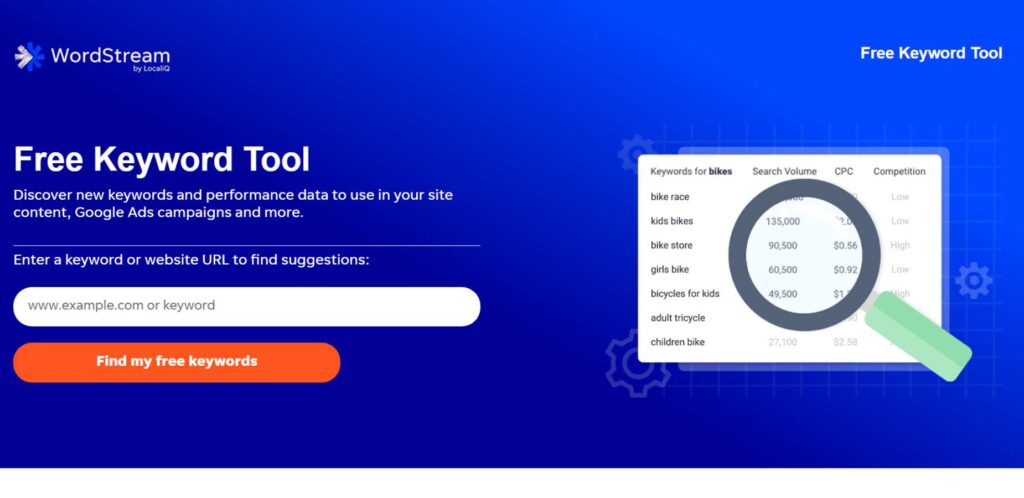
The keywords you generate using WordStream’s Keyword Tool can be expected to perform well, judging from factors such as the number of searches made on it and the number of competitors using the keywords. It provides data that concerns keyword effectiveness and is useful in grouping and categorizing keywords, which is why it is rather useful in terms of keyword management and optimization.
Main Features:
- Keyword Discovery: Discover keywords suitable for PPC advertising.
- Search Volume Data: Even information on the frequency of piracy of keywords can be accessed easily.
- PPC Keyword Analysis: Optimize keywords for the Pay Per Click adverting model.
Positives:
- Integrates well with PPC campaigns
- Easy-to-use interface
- Effective for finding high-converting keywords
Negatives:
- More focused on PPC than SEO
- Limited SEO-specific features
Pricing:
- Wordstream Advisor: starts from $299 per month
- Keyword tool: generally starts from 49$ per month
- Free tools: free
Website: www.wordstream.com/keywords
How do you choose the right keyword research tool?
Selecting the right keyword analysis tool in 2024 for your business is not without some significant factors to consider. When using these criteria, you will be directed towards the tools that will serve the purpose and are within your affordable range, depending on your company’s marketing budget and internet marketing strategies.
1. Data Accuracy and Reliability:
To get those materials, find her choices that would search the newest and most credible information from the purest and most credible sources like keywords and perhaps databases.
2. Keyword Suggestions and Ideation:
A good keyword research tool should be able to give other options of the focused keywords and other keywords that are as important for the niche besides giving new and unrecognized keywords.
3. Search Volume and Trend Analysis:
Whenever the process of implementing keywords is under consideration, it is always wise to take into account the number search ratio and trends to realize what sort of impact it would create.
4. Competitor Analysis:
How competitors’ keyword analysis is done could also be totally different, and therefore, knowing these strategies is useful. Competitive analysis tools can serve as a compass to enable you to identify areas that may be of weakness to you or areas that could be of strength to you.
5. Integration and Compatibility:
For instance, consider concepts that can be easily enhanced with the existing digital marketing arsenal, which include search engine optimization tools, content management systems, and analytics. This facilitates the reduction of normal working processes and optimizes organizational results through the use of measurements.
Conclusion
Finding the perfect keyword research site may be a hectic task, but with this list of top keyword research tools, it will be easier for you to do so.
I have added both free and paid lists so that you can choose the site that suits your niche and fulfills your requirements.
Introducing the right keyword research tool is the first crucial element in enhancing one’s SEO and content marketing plan. There is a variety of resources, reliable and versatile, tailored for various needs and price ranges depending on your business or project – from data-oriented to easy-to-use interface- see the above list.
Feel free to explore these tools and refine your keyword strategy to stay ahead in the competitive digital space!
FAQs
1. What is keyword research?
Keyword research is a process of defining and investigating the particular phrases that people use while looking for specific data over the web. This is important for SEO and content marketing because it guides the identification of relevant keywords to help drive people to your website.
2. Which tool should I use when choosing a keyword research tool?
You should select a keyword research tool depending on your budget requirements, the amount of information you need, and additional functions like competitors‘ analysis or local orientation.
3. Are all free keyword sites effective?
Most of the keywords research can be conducted through free tools; however, their functionality is rather limited in terms of data availability and tools. Most often, the paid tools are more informative and provide extra features and options.
4. How often should I use keyword research sites?
Keyword research is best conducted on an ongoing basis. The frequency of updating the keyword list should be followed depending on certain changes in the search engine, the competitors, and your articles.

